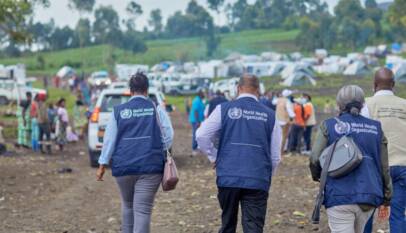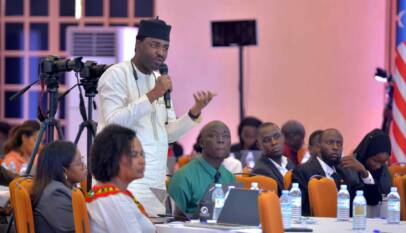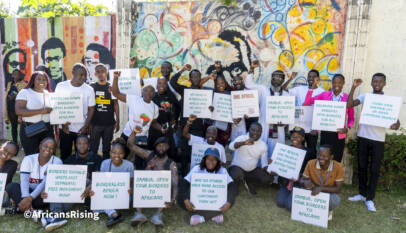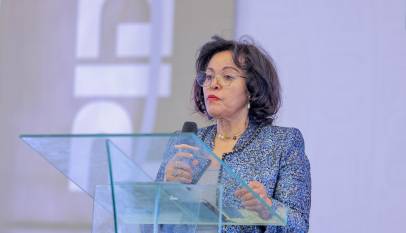“Why Nigerian Red Cross must earn people’s trust and confidence” – President
Elder Bolaji Akpan Anani is the National President of the Nigerian Red Cross Society, NCRS. In a chat with African Newspage, he speaks on his effort to reposition the Society
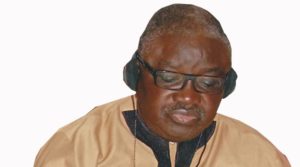
You are now over one year old in office, how has it been presiding over the affairs of the biggest humanitarian organization in Nigeria?
For me, it is a privilege to have been elected as National President of the Nigerian Red Cross Society, NCRS, but the challenges are enormous because we have met a society that was in a difficult stage of its development; a society that had challenges which made it difficult for people to trust it. We met a situation where activities couldn’t be completed on schedule and reports couldn’t be presented as scheduled, where funding had been at its lowest ebb because of the issue of lack of trust in the organization. That meant that we needed to look critically at the causes of the problems and begin to find what to do to change the perception and therefore change the fortune of the organization. So, we have been digging in to find out what the problems are, how they came to be and what we need to do to change the situation of things. That was what we have been busy doing in the last one year and it has taken us out of the country and to many parts of the country so as to be able to get to the real issues.
What measures have you taken thus far to reposition the society?
Like I said, the first thing is to find out what went wrong and we discovered that a number of things went wrong. One has to do with personnel, I mean staff’s capacity, approach to transparency and accountability as well as ability to deliver on their responsibilities. For our volunteers in the field, they are very effective and productive. So, we are now looking into the capacity of our staff to see what needs to be done to reposition our staffing system. We have therefore reassigned our staff to various locations according to their training, experience and competence and for us in the Red Cross, what we look for include academic qualification, humanitarian spirit, competence as well as skill in the execution of a particular assignment. We are looking at such policies we don’t have and trying to enact them including fraud and corruption policy, procurement policy, volunteer development policy, and youth involvement policy etc. We met a status that was inconclusive and we are now getting close to having a status or constitution of the Nigerian Red Cross, which will guide us. We have already concluded a strategic development plan for the next 5 years which gives us focus; out of it we have extracted a 2016 action plan. We are trying to be organized in everything we do and now know what we need to do to be where we want to be at so and so time. We also recently engaged the services of a firm to carry out an audit of everything we do, and not just financial audit but an external evaluation of everything we do including our meetings, our programs, our policies etc.
Based on the 5-year strategic plan, what is your vision for the Nigerian Red Cross?
We are operating a national society in which all we do is just waiting for people to bring funds for us to carry out activities. Our mandates areas are beyond that. So, we want to graduate from a society that waits for funds to implement programs to a society which because of trust and confidence of people in us, we can attract funds directly to execute projects within our mandate areas and can even be supporting work in other national Red Cross societies. I mean strong not only in terms of finances but also in terms of competence, number of personnel, organizational stability etc. So, that’s where I hope we will be by God’s grace in the next 5 years.
One of the biggest challenges nonprofits face has to do with fundraising. How do you hope to source funds to be able to finance your programs?
The activities of Red Cross are desirous activities, activities that are desired by the people because what we do is support the vulnerable, and those who cannot help themselves as such our activities ought to attract attention and support and if we are not getting that it is because our visibility has become very low, therefore, if we can restore people’s confidence and trust in us as well as increase our visibility, we will be able to change their perception about us. Trust is the most important element in partnership which is not given but earned so if we can earn the people’s trust back, funding won’t be an issue. If we can get people to know that we have the right staff, system and structure to be able to deliver on our mandate for any project they are supporting us for, we will be able to attract funding.
Secondly, we have properties across the country donates to us by state governments and individuals, for example, we have a large expanse of land in Suleja, if we can put up a training center and possibly a hotel there while also providing other services within our mandate areas, we will be able to generate some funds. We also have clinics in Ibadan and Enugu; we are hoping to establish more of such clinics to boost our revenue base.
The Boko Haram insurgency may soon end. What are your plans concerning rehabilitation and reconstruction in the Northeast?
We must appreciate the fact that even though independent we work in collaboration with government and its agencies in the sense that there are things that are basically the responsibility of nation states, for example, rehabilitation of IDPs, and rebuilding of their homes. For now, what we do for IDPs is look at their health situation and since we don’t have drugs we advise government on the necessary medication. Secondly, since the IDPs are not living in their comfort zones, they are no longer living in areas where their livelihood is assured, we provide them with vocational skills so they can earn livelihood. We are also involved in restoring family ties in cases where family members have been separated by the crisis. Building shelters is also part of our mandate which we are doing in the Northeast, having done that in Kogi State in the aftermath of the 2012 flood. We will also advise people in the region on environmental safety in the new shelters.







